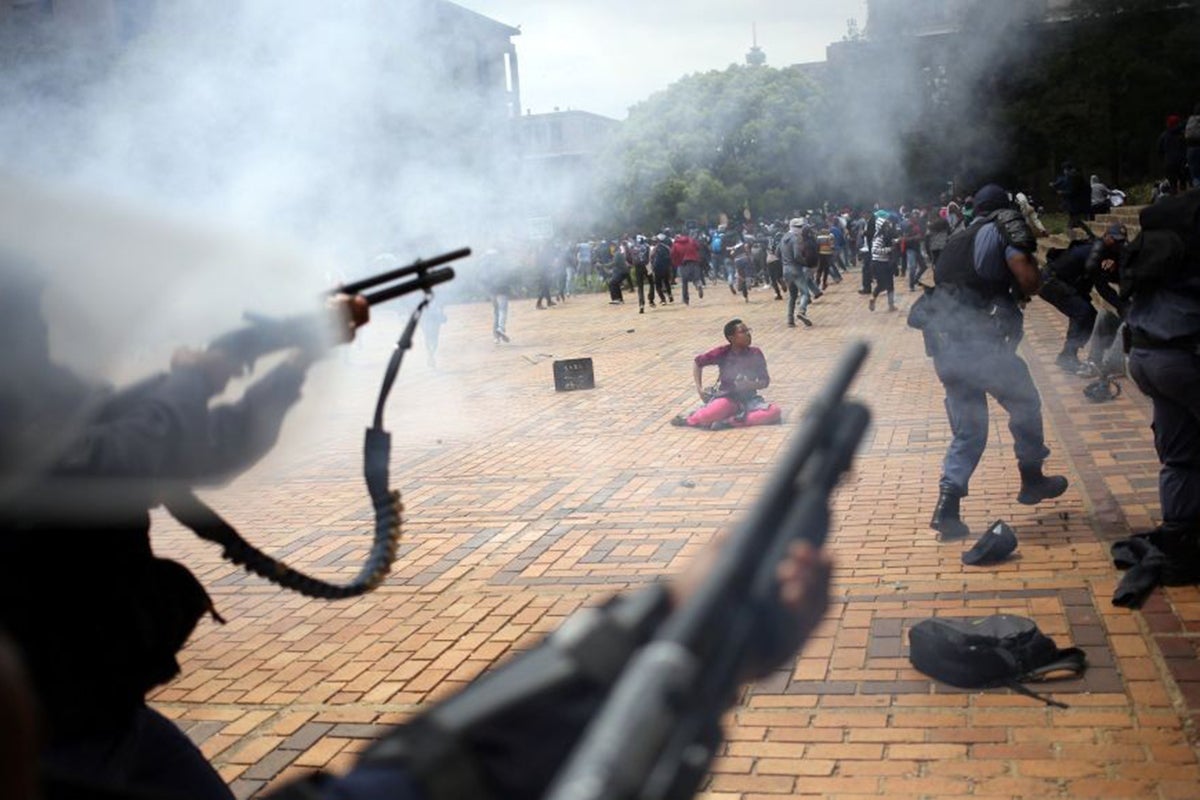South African student tuition fees protest met with stun grenades and rubber bullets
One university campus square is strewn with spent shotgun shells and rocks after skirmishes between police and protesters
Your support helps us to tell the story
From reproductive rights to climate change to Big Tech, The Independent is on the ground when the story is developing. Whether it's investigating the financials of Elon Musk's pro-Trump PAC or producing our latest documentary, 'The A Word', which shines a light on the American women fighting for reproductive rights, we know how important it is to parse out the facts from the messaging.
At such a critical moment in US history, we need reporters on the ground. Your donation allows us to keep sending journalists to speak to both sides of the story.
The Independent is trusted by Americans across the entire political spectrum. And unlike many other quality news outlets, we choose not to lock Americans out of our reporting and analysis with paywalls. We believe quality journalism should be available to everyone, paid for by those who can afford it.
Your support makes all the difference.South African police have fired rubber bullets and set off stun grenades and teargas to disperse student protesters amid nationwide demonstrations over high tuition fees.
Hundreds of protesters gathered at Johannesburg’s Wits University before officers moved in to enforce a ban on public gatherings.
Many students performed the “toyi-toyi” protest dance, made popular during the struggle against oppressive white rule in South Africa and some retaliated against officers by throwing rocks at police cars.

At least two were arrested when police moved in to enforce a court order on public gathering at Wits, whose full name is the University of the Witwatersrand.
The square in front of the main hall on campus was strewn with spent shotgun shells and rocks after several skirmishes between police and protesters.
“Wits is Ours,” read a banner held up by protesters who accused police of confronting them first. They pulled up paving stones and broke them into pieces, hurling the debris at officers.
A police woman in riot gear hobbling from the scene with assistance from her colleagues told Reuters she had been hit in the leg with a stone thrown by protesters.
Adam Habib, the university's vice-chancellor, had said police and private security guards would be present to help “take back our campus” on behalf of staff and students who wanted to return to class. Spokeswoman Shirona Patel said the university had reopened on Monday but claimed that some lecturers had been forced out of their offices by students. On Tuesday, the main campus was disrupted, but classes proceeded on other Wits campuses.
“Following yesterday's harassment of our staff, we have no choice but to deploy police around campus,” Ms Patel added.
Demonstrations over the cost of university education, which is prohibitive for many black students, have highlighted frustration at enduring inequalities in Africa’s most industrialised country more than two decades after the end of Apartheid, there is also the belief among demonstrators that universities and other institutions were not adequately transformed to benefit the black majority after the end of white minority rule in 1994.
“We're all angry,” said Nkululeko Tselane, a law student. He described university warnings that the protests might force the cancellation of the academic year as a “scare tactic” and vowed that demonstrations would continue.
“I am not sure free education is feasible. And I am worried about attacks on other students. It's inflicting fear in other students. It's not right,” one final year law student told Reuters. who was not taking part in the protest but did not want to give his name.
Protests also continued at the University of Cape Town and two students were also arrested after protesters tried to block entrances and disrupt lectures. However, Max Price, the vice-chancellor said most operations proceeded at the university.
The protests first erupted last year, then subsided as the government froze fee increases and set up a commission to look into the education funding system.
The unrest boiled over again, closing some classes and universities, when the commission said on 19 September that fees would continue to rise, albeit with an 8 per cent cap in 2017.
University administrators across South Africa have warned that any further fee freezes could damage their academic programmes.
President Jacob Zuma said the protests have caused about 605m rand (£35m) in property damage and threaten to sabotage the country’s higher education system.
Additional reporting by agencies

Join our commenting forum
Join thought-provoking conversations, follow other Independent readers and see their replies
Comments